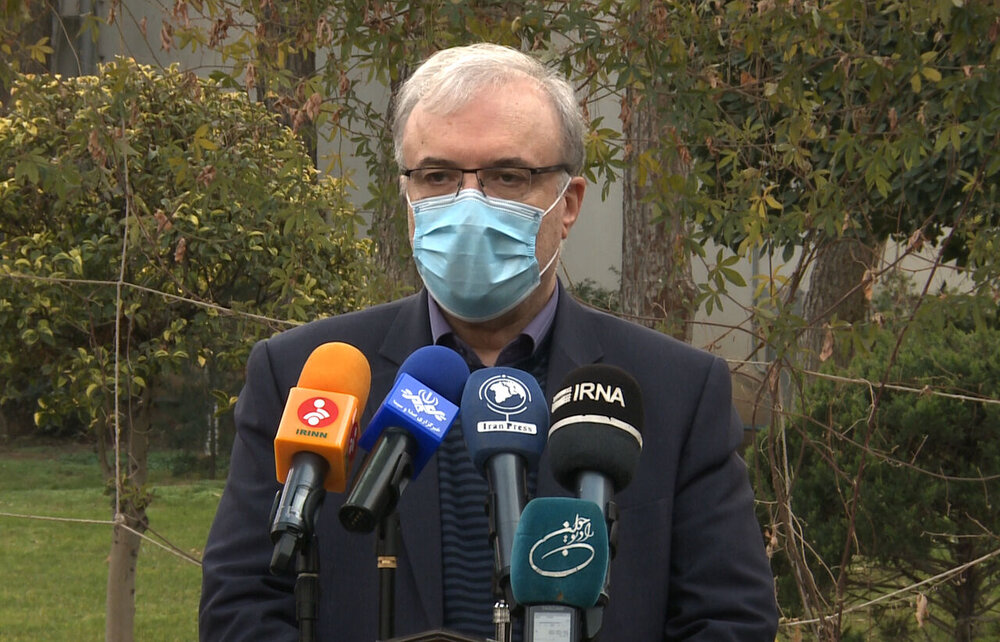No cases of UK mutated coronavirus found in Iran: minister

TEHRAN – So far, no cases of the new coronavirus recently emerged in the United Kingdom have been observed in Iran, Health Minister Saeed Namaki has said, emphasizing that all foreign travelers from the UK are being monitored.
As soon as the United Kingdom announced a new COVID-19 strain one to two months after its emergence, Iran immediately banned flights to and from the UK.
Currently, all passengers entering Iran from England undergo diagnostic tests for the new COVID-19. European travelers are also tested for coronavirus, and they must stay in quarantine for two weeks.
All travelers who have entered the country from the UK in the last two or three weeks, one by one, are being monitored, he said.
“No cases of the new virus have so far been found in the country, but we are still investigating and will announce if any case is identified,” he highlighted.
Referring to the coronavirus vaccine, he expressed readiness to import the vaccine without any barriers and it will soon be provided.
With the efforts of the Basij, people, and volunteers, as well as a national plan named after martyr Qassem Soleimani so far the transmission chain of the disease has decreased by 50 percent, and high-risk red zones turned to yellow and orange.
Martyr Soleimani plan is being implemented in cooperation with the Ministry of Health, Basij, and the Red Crescent Society, through which volunteer forces provide information, testing, diagnosis, referral of suspects to health centers, and offer services by visiting people’s homes.
Some 22,530 monitoring teams have been formed within the framework of the plan since December 15 with 103,000 members, of which more than 270,000 are in contact to identify COVID-19 patients, said Jafar Sadeq-Tabrizi, head of the Network Management Center of the Ministry of Health.
Some 6,730 home care teams have been formed in the country with the participation of 18,000 forces, who have taken care of 41,000 people at home, and rapid result tests have been performed on 7,500 suspects, he explained.
Since December 15, with the participation of 61,000 people, more than 10,000 monitoring teams have been formed. About 782,000 visits and monitoring of various places and centers have been done to warn those who do not observe the health protocols, Sadeq-Tabrizi stated.
COVID-19 toll, new cases on a declining trend
Due to the high prevalence of the disease, strict COVID-19 restrictions took effect on October 26.
The National Headquarters for Coronavirus Control started strict restrictions in 43 cities that had the highest rate of infection in the country. Ten days later, decisions were made to set new limitations on highly-affected areas for another 10 days, through which 46 cities undergone restrictions.
The plan divided cities into three levels of alert, namely red, orange, and yellow.
Another plan also went into effect on November 21, according to which all occupations, except for emergency services and basic food suppliers, get closed for two weeks in high-risk cities.
Alireza Reisi, a spokesman for the National Headquarters for Coronavirus Control, said on December 19 that the disease prevalence is declining in 30 of the whole 31 provinces and the death toll had dropped to 50 percent in comparison to the previous month. Also, the hospitalization rate has been reduced by 40 percent.
In a press briefing on Wednesday, Health Ministry spokesperson Sima-Sadat Lari confirmed 6,261 new cases of COVID-19 infection, raising the total number of infections to 1,177,004. She added that 914,194 patients have so far recovered, but 5,419 still remain in critical conditions of the disease.
During the past 24 hours, 153 patients have lost their lives, bringing the total number of deaths to 54,156, she added.
So far, 7,201,567 COVID-19 diagnostic tests have been performed in the country.
Lari noted that currently, 205 cities are in low-risk “orange” zones, and 243 cities are in yellow.
FB/MG
Leave a Comment